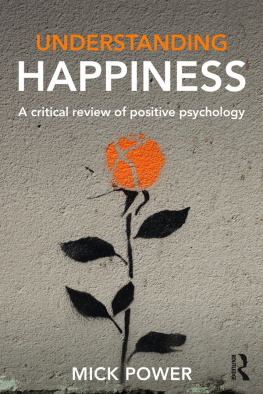Exploring Positive Psychology
Exploring Positive Psychology
The Science of Happiness and Well-Being
Erik M. Gregory and
Pamela B. Rutledge
Copyright 2016 by ABC-CLIO, LLC
All rights reserved. No part of this publication may be reproduced, stored in a retrieval system, or transmitted, in any form or by any means, electronic, mechanical, photocopying, recording, or otherwise, except for the inclusion of brief quotations in a review, without prior permission in writing from the publisher.
Library of Congress Cataloging-in-Publication Data
Names: Gregory, Erik M., author. | Rutledge, Pamela B., author.
Title: Exploring positive psychology : the science of happiness and well-being / Erik M. Gregory and Pamela B. Rutledge.
Description: Santa Barbara : Greenwood, 2016. | Includes bibliographical references and index.
Identifiers: LCCN 2016015544 | ISBN 9781610699396 (alk. paper) | ISBN 9781610699402 (ebook)
Subjects: LCSH: Positive psychology. | Happiness. | Well-being.
Classification: LCC BF204.6 .G74 2016 | DDC 150.19/88dc23
LC record available at https://lccn.loc.gov/2016015544
ISBN: 978-1-61069-939-6
EISBN: 978-1-61069-940-2
20 19 18 17 16 1 2 3 4 5
This book is also available as an eBook.
Green Wood
An Imprint of ABC-CLIO, LLC
ABC-CLIO, LLC
130 Cremona Drive, P.O. Box 1911
Santa Barbara, California 93116-1911
www.abc-clio.com
This book is printed on acid-free paper 
Manufactured in the United States of America
Erik:
For Rictor, Elfie, Miriam, and the Harvard Humanist Hub community
Thanks to Joe, Kelly, and Ligia for their support and enthusiasm; Marissa Herzog for helping us put this all together; and to Pamela Rutledge, a wonderful colleague and friend.
Pam:
For Katie and Elizabeth
Thanks to my parents Cathie and Syd, for always seeing the rich narrative in life; my husband John Rutledge for his continued support and encouragement; Marissa Herzog for her attention to detail; and to Erik Gregory, who continues to open new doors and say come on in!
Contents
Happiness is produced not so much by great pieces of good fortune that seldom happen as by little advantages that occur every day.
Benjamin Franklin
It should not come as a surprise that North Americans have embraced positive psychology, with its emphasis on self-betterment, and made the pursuit of happiness an industry unto itself. In 2013, over 50 million inspirational books, self-help books, and how-to books were purchased in the United States, ringing up over $11 billion in sales. Happiness is so part of the very fabric of the United States that it is written as a right in the Declaration of Independence, which emphasizes the pursuit of life, liberty, and happiness. Today much of this pursuit of happiness in fact fuels the U.S. economies and others in the form of consumerism created by industries that ceaselessly promote the consumption of goods as the road to well-being.
The study of well-being is an age-old pursuit. The philosophers of ancient Greece believed happiness arose through a life of freedom where basic needs were met and individuals had time for intellectual reflection. Aristotle argued that happiness is the supreme good, and all else man did in life was in pursuit of attaining happiness. Cicero said, There is no fool who is happy, and no wise man who is not. Happiness was seen as above passion and material rewards.
Epicurus claimed that happiness was the result of a simple life that included tranquility and peace of mind. He believed that the wise individual takes delight in the present and faces the future without fear. And the Stoics believed that happiness was the attainment of noble characteristics such as the wisdom to know between good and bad, right and wrong.
Today, the question of well-being continues to play a central role in our personal lives and in the life of modern science. Researchers have a wealth of data regarding individual physical and material well-being, yet despite all of this data, there are just the beginnings of an understanding of why some people seem to experience a life with more well-being than others.
In his 1992 book The Pursuit of Happiness: Discovering the Pathway to Fulfillment, Well-Being, and Enduring Personal Joy , David G. Myers beautifully captures the dilemma our society faces today in trying to understand well-being. He wrote:
For never has a century known such abundance, or such massive genocide and environmental devastation.
Never has a culture experienced such comfort and opportunity, or such widespread depression.
Never has a technology given us so many conveniences, or such terrible instruments of degradation and destruction.
Never have we been so self-reliant, or so lonely.
Never have we seemed so free, or our prisons so overstuffed.
Never have we had so much education, or such high rates of teen delinquency, despair, and suicide.
Never have we been so sophisticated about pleasure, or so likely to suffer broken or miserable marriages.
In a meta-analysis of studies examining well-being, Myers found a number of popular notions about what it takes to be happy dispelled. These myths include:
- That few people are genuinely happy
- That wealth buys well-being
- That tragedies or traumatic events destroy happiness
- That happiness springs from memories of intense, if rare, positive experiences
- That teens and elderly are the unhappiest populations
- That one gender is happier than the other
If these are the myths about happiness, then what do we know about wellbeing? In the past 20 years, there has been a great deal of research on this very question. Positive psychologists have largely been leading the way in asking questions about positive traits, fostering excellence, subjective wellbeing, resiliency, life satisfactionand have done so with the use of the scientific method in order to understand the complexity of human behavior. Seligman and Csikszentmihalyi (2000), leaders in the field of positive psychology, wrote, Psychology is not just the study of pathology, weakness, and damage; it is also the study of strength and virtue... treatment is not just fixing what is broken; it is nurturing what is best.
Psychology has traditionally looked at diseases such as anxiety and depression as real and human strengths as simply coping mechanisms. Positive psychologists study the building blocks of characteristics such as courage, forgiveness, optimism, hope, and joy so that there can be a greater understanding of how to promote that which is healthy in human beings and to collect a set of psychological tools in which to treat the number of individuals seeking mental health services.
Positive psychologists examine preventive factors that promote positive human functioning and provide information to scientists and practitioners not only as a means of bettering understanding of human behavior, but also as a means of improving the mental health of the public.
The academic psychology literature has traditionally focused on issues of anxiety and depression 100 times more than the journal articles on the topics of joy and well-being. Positive psychologists such as Seligman argue that this orientation has left psychology blind to individual growth, mastery, and insight that human beings are able to harness in order to overcome the pain and setbacks of life. Seligman believes that by building psychological muscles through positive psychology research, one can create a public health promotion of the mind and prevent problems before they occur. Certainly he recognizes that human limitations exist, but he argues that individuals can function optimally within those limits.

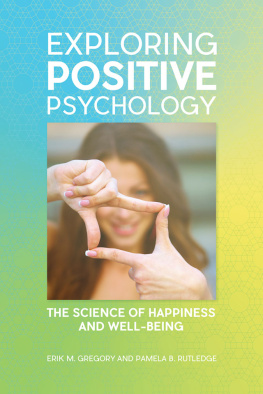


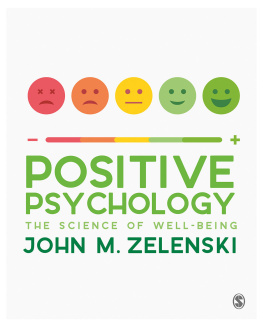


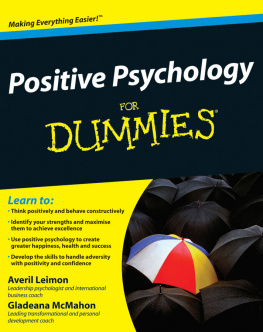
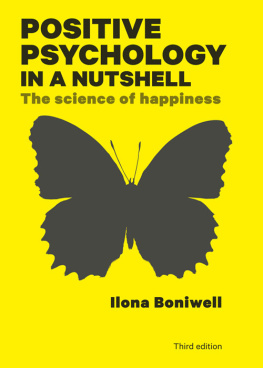
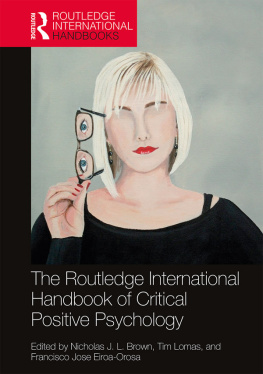
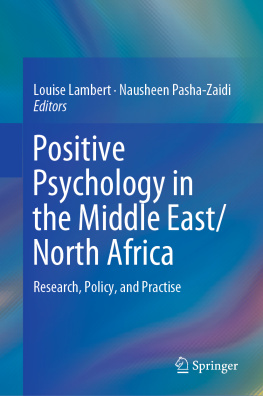
![Sarah Lewis [Sarah Lewis] - Positive Psychology and Change](/uploads/posts/book/124055/thumbs/sarah-lewis-sarah-lewis-positive-psychology-and.jpg)
